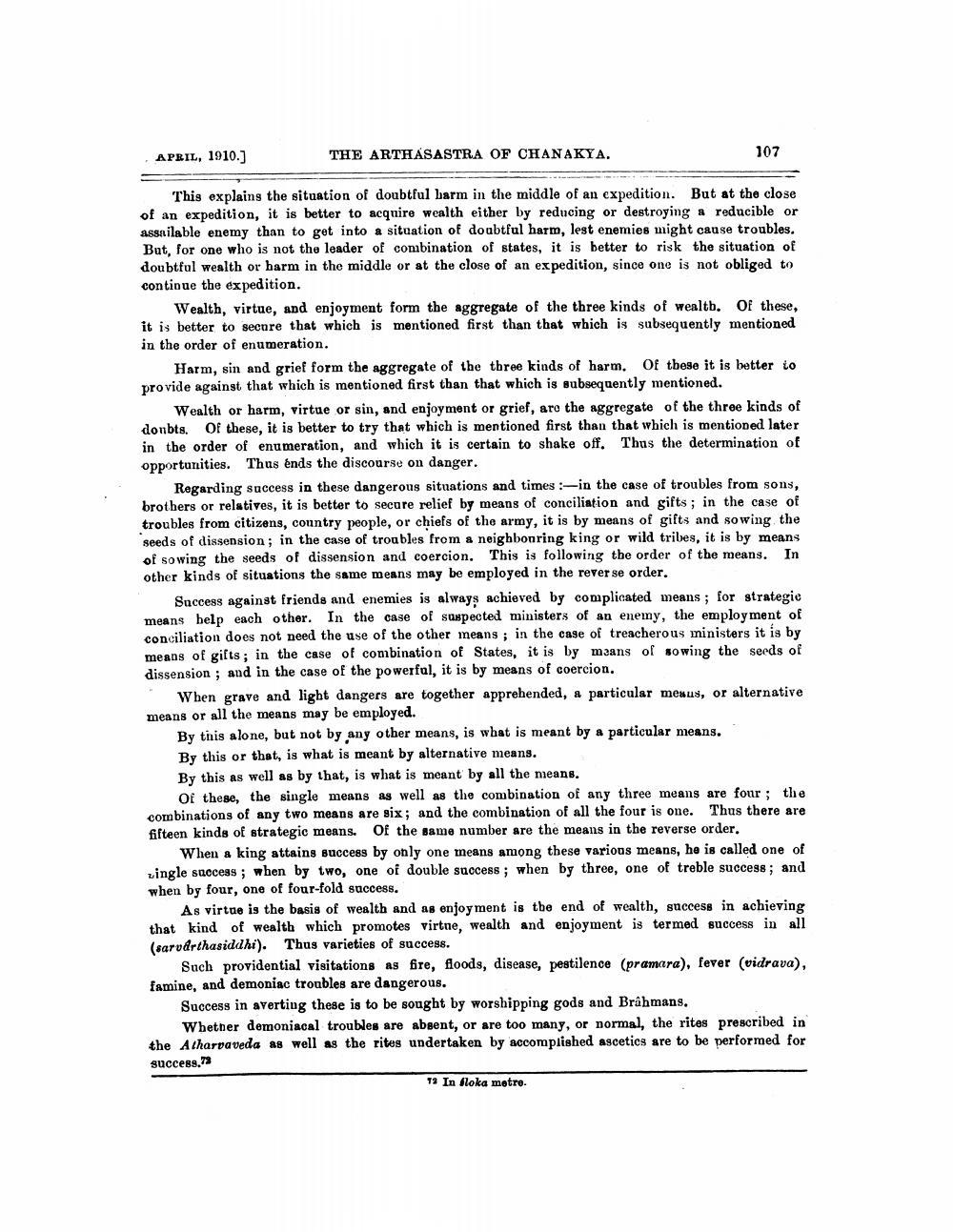________________
APRIL, 1910.)
THE ARTHASASTRA OF CHANAKYA.
107
This explains the situation of doubtful barm in the middle of an expedition. But at the close of an expedition, it is better to acquire wealth either by reducing or destroying a reducible or assailable enemy than to get into a situation of doubtful harm, lest enemies might cause troubles. But, for one who is not the leader of combination of states, it is better to risk the situation of doubtful wealth or harm in the middle or at the close of an expedition, since one is not obliged to continue the expedition.
Wealth, virtue, and enjoyment form the aggregate of the three kinds of wealth. Of these, it is better to secure that which is mentioned first than that which is subsequently mentioned in the order of enumeration.
Harm, sin and grief form the aggregate of the three kinds of harm. Of these it is better to provide against that which is mentioned first than that which is subsequently mentioned.
Wealth or harm, virtue or sin, and enjoyment or grief, are the aggregate of the three kinds of donbts. Of these, it is better to try that which is mentioned first than that which is mentioned later in the order of enumeration, and which it is certain to shake off. Thus the determination of opportunities. Thus ends the discourse on danger.
Regarding success in these dangerous situations and times in the case of troubles from sons, brothers or relatives, it is better to secure relief by means of conciliation and gifts; in the case of troubles from citizens, country people, or chiefs of the army, it is by means of gifts and sowing the seeds of dissension; in the case of troubles from a neighbouring king or wild tribes, it is by means of sowing the seeds of dissension and coercion. This is following the order of the means. In other kinds of situations the same means may be employed in the reverse order.
Success against friends and enemies is always achieved by complicated means; for strategie means belp each other. In the case of suspected ministers of an enemy, the employment of conciliation does not need the use of the other means; in the case of treacherous ministers it is by means of gifts; in the case of combination of States, it is by means of sowing the seeds of dissension; and in the case of the powerful, it is by means of coercion.
When grave and light dangers are together apprehended, a particular mexus, or alternative means or all the means may be employed.
By this alone, but not by any other means, is what is meant by a particular means. By this or that, is what is meant by alternative means. By this as well as by that, is what is meant by all the means.
Of these, the single means as well as the combination of any three means are four; the combinations of any two means are six; and the combination of all the four is one. Thus there are fifteen kinds of strategic means. Of the same number are the means in the reverse order.
When a king attains success by only one means among these various means, he is called one of zingle success; when by two, one of double success; when by three, one of treble success; and when by four, one of four-fold success.
As virtue is the basis of wealth and as enjoyment is the end of wealth, success in achieving that kind of wealth which promotes virtne, wealth and enjoyment is termed success in all (sarvarthasiddhi). Thus varieties of success.
Such providential visitations as fire, floods, disease, pestilence (pramara), fever (vidrava), famine, and demoniac troubles are dangerous.
Success in averting these is to be sought by worshipping gods and Brâhmans,
Whether demoniacal troubles are absent, or are too many, or normal, the rites prescribed in the Athardaveda as well as the rites undertaken by accomplished ascetics are to be performed for success.72
13 In Noka metro.




